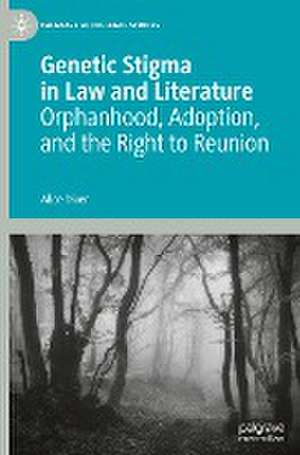Genetic Stigma in Law and Literature: Orphanhood, Adoption, and the Right to Reunion: Palgrave Socio-Legal Studies
Autor Alice Diveren Limba Engleză Hardback – 19 dec 2023
This book critically analyses the way in which traditional sociocultural and legal biases might be perpetuated against those with unknown – or unknowable – genetic ancestries. It looks to law and works of literature across differing eras and genres focussing upon such concepts as inherited stigma, illegitimacy, orphanisation, adoption, othering, reunion, and the ‘right’ to access truths that relate to one’s original identity. Law’s role in such matters is often limited (or usurped) by custom, practice, or lingering superstitious beliefs; the importance of oral and written testimony is therefore highlighted. Characters include abandoned or orphaned figures from folk and fairy tales, Romantic and Victorian monsters and heroes, Dickensian waifs, Edwardian rescue orphans, and dystopia-set ‘rebels.‘ Their insights and experiences are mirrored in various present day scenarios that speak to familial human rights abuses, not least forced adoptions and bars on accessing original information. This cross-disciplinary book drawing on Law, Literature, Sociology, Critical Adoption Studies should be of interest to those interested in and those who have been affected in some way by adoption, origin deprivation, or reunion.
Din seria Palgrave Socio-Legal Studies
-
 Preț: 234.50 lei
Preț: 234.50 lei -
 Preț: 197.34 lei
Preț: 197.34 lei -
 Preț: 385.84 lei
Preț: 385.84 lei - 18%
 Preț: 891.96 lei
Preț: 891.96 lei - 15%
 Preț: 580.82 lei
Preț: 580.82 lei - 15%
 Preț: 644.18 lei
Preț: 644.18 lei - 15%
 Preț: 469.91 lei
Preț: 469.91 lei -
 Preț: 424.43 lei
Preț: 424.43 lei - 15%
 Preț: 471.37 lei
Preț: 471.37 lei - 18%
 Preț: 730.47 lei
Preț: 730.47 lei - 15%
 Preț: 581.65 lei
Preț: 581.65 lei - 15%
 Preț: 572.48 lei
Preț: 572.48 lei - 15%
 Preț: 639.25 lei
Preț: 639.25 lei - 15%
 Preț: 644.95 lei
Preț: 644.95 lei - 15%
 Preț: 643.00 lei
Preț: 643.00 lei - 15%
 Preț: 581.14 lei
Preț: 581.14 lei - 15%
 Preț: 640.88 lei
Preț: 640.88 lei - 18%
 Preț: 788.90 lei
Preț: 788.90 lei - 15%
 Preț: 588.18 lei
Preț: 588.18 lei - 18%
 Preț: 788.72 lei
Preț: 788.72 lei -
 Preț: 200.30 lei
Preț: 200.30 lei - 18%
 Preț: 891.96 lei
Preț: 891.96 lei - 15%
 Preț: 703.06 lei
Preț: 703.06 lei - 15%
 Preț: 703.85 lei
Preț: 703.85 lei -
 Preț: 389.49 lei
Preț: 389.49 lei -
 Preț: 389.88 lei
Preț: 389.88 lei -
 Preț: 445.12 lei
Preț: 445.12 lei -
 Preț: 389.70 lei
Preț: 389.70 lei - 18%
 Preț: 786.84 lei
Preț: 786.84 lei - 15%
 Preț: 644.69 lei
Preț: 644.69 lei - 18%
 Preț: 731.10 lei
Preț: 731.10 lei -
 Preț: 390.63 lei
Preț: 390.63 lei -
 Preț: 291.67 lei
Preț: 291.67 lei - 15%
 Preț: 700.29 lei
Preț: 700.29 lei - 18%
 Preț: 732.70 lei
Preț: 732.70 lei -
 Preț: 234.35 lei
Preț: 234.35 lei -
 Preț: 394.51 lei
Preț: 394.51 lei -
 Preț: 486.21 lei
Preț: 486.21 lei
Preț: 698.30 lei
Preț vechi: 821.53 lei
-15% Nou
Puncte Express: 1047
Preț estimativ în valută:
133.62€ • 139.24$ • 110.64£
133.62€ • 139.24$ • 110.64£
Carte tipărită la comandă
Livrare economică 03-17 aprilie
Preluare comenzi: 021 569.72.76
Specificații
ISBN-13: 9783031462450
ISBN-10: 3031462459
Ilustrații: VIII, 189 p. 1 illus.
Dimensiuni: 155 x 235 mm
Greutate: 0.46 kg
Ediția:1st ed. 2023
Editura: Springer International Publishing
Colecția Palgrave Macmillan
Seria Palgrave Socio-Legal Studies
Locul publicării:Cham, Switzerland
ISBN-10: 3031462459
Ilustrații: VIII, 189 p. 1 illus.
Dimensiuni: 155 x 235 mm
Greutate: 0.46 kg
Ediția:1st ed. 2023
Editura: Springer International Publishing
Colecția Palgrave Macmillan
Seria Palgrave Socio-Legal Studies
Locul publicării:Cham, Switzerland
Cuprins
1. Introduction.- 2. From the Romans to the heroic monstrous: Folkloric demons, tricksters, and changelings.- 3. Legislative reform, social justice, heroic ‘orphans’ and the rise of human rights.- 4. Fairy tales, Secrecy, shame, and stigma.- 5. Conclusion. Legal Fictions, Dystopian Truths
Notă biografică
Alice Diver is Lecturer in Family Law at The School of Law, Queen’s University, Belfast, Northern Ireland.
Textul de pe ultima copertă
This book critically analyses the way in which traditional sociocultural and legal biases might be perpetuated against those with unknown – or unknowable – genetic ancestries. It looks to law and works of literature across differing eras and genres focussing upon such concepts as inherited stigma, illegitimacy, orphanisation, adoption, othering, reunion, and the ‘right’ to access truths that relate to one’s original identity. Law’s role in such matters is often limited (or usurped) by custom, practice, or lingering superstitious beliefs; the importance of oral and written testimony is therefore highlighted. Characters include abandoned or orphaned figures from folk and fairy tales, Romantic and Victorian monsters and heroes, Dickensian waifs, Edwardian rescue orphans, and dystopia-set ‘rebels.‘ Their insights and experiences are mirrored in various present day scenarios that speak to familial human rights abuses, not least forced adoptions and bars on accessing originalinformation. This cross-disciplinary book drawing on Law, Literature, Sociology, Critical Adoption Studies should be of interest to those interested in and those who have been affected in some way by adoption, origin deprivation, or reunion.
Alice Diver is Lecturer in Family Law at The School of Law, Queen’s University, Belfast, Northern Ireland.
Caracteristici
Presents an interdisciplinary look at adoption and ‘orphanhood’ through analysis of literature/fiction and law Traces the stigmatizing, ‘othering’ effects chronologically across different historical eras Uses these ‘testimonies’ as a better way to explore and achieve meaningful changes to sociocultural attitudes
